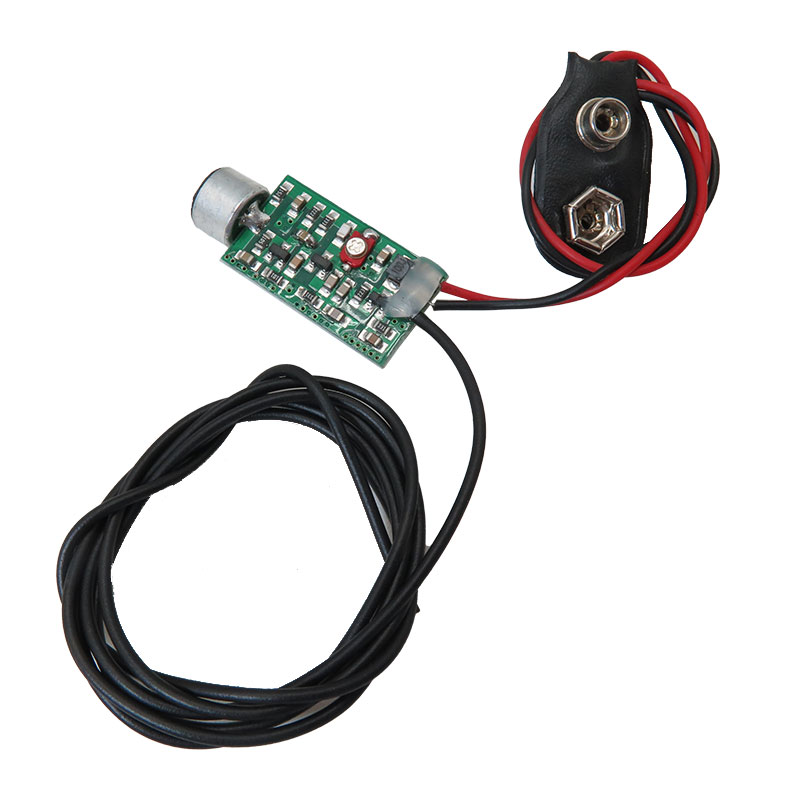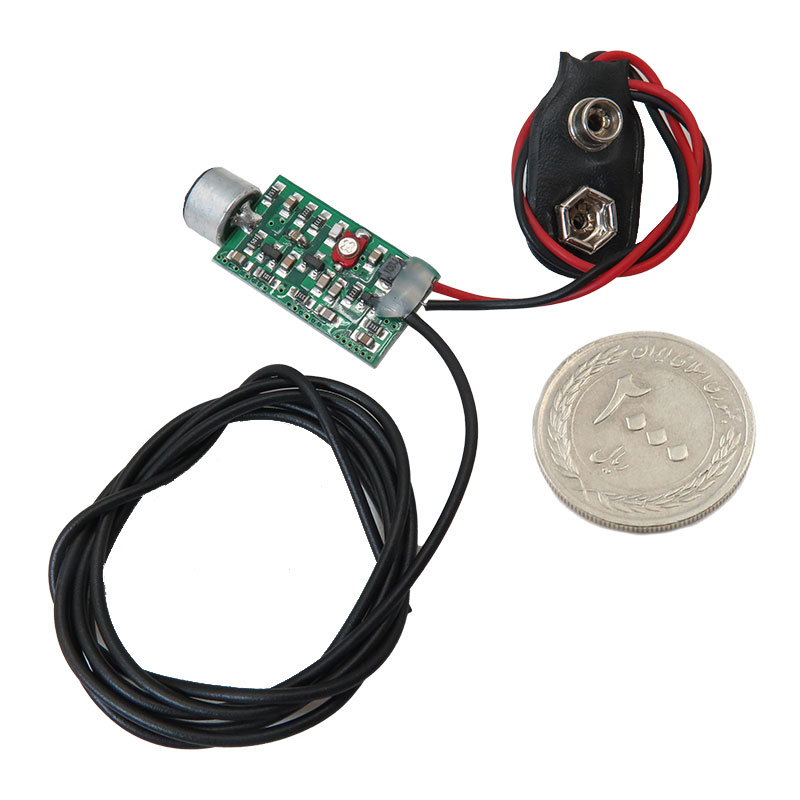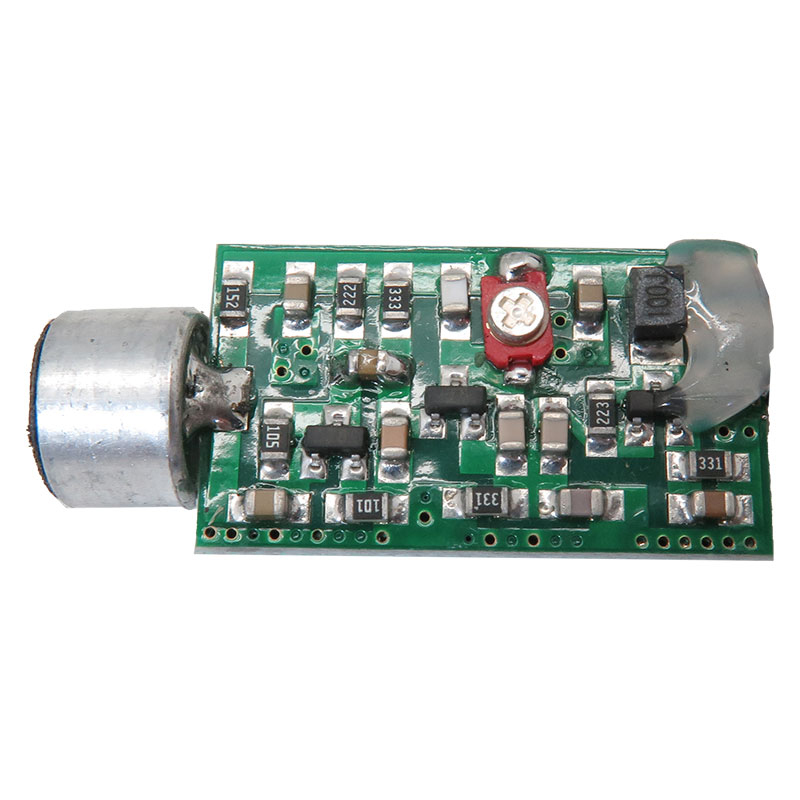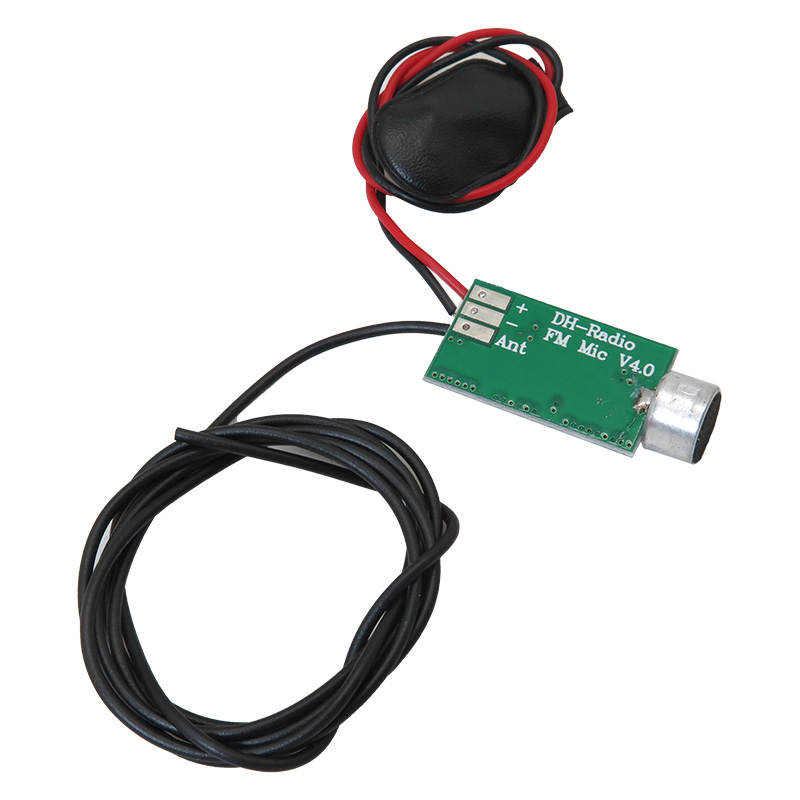595,370 تومان
کالا موجود استموجودی انبار : 8 عدد
علاقه مندان : 10 نفر
وضعیت : فعال
تعداد مرجوعی : 0
دنبال کنندگان : 13 نفر
قدمت : 10 سال و 1 ماه و 26 روز
وزن : 3 گرم
کل فروش : 281 عدد
تعداد سفارش ها : 215 سفارش
5 از 5.0 با 19 رای
ماژول فرستنده FM - فرستنده رادیویی باند FM
ماژول فرستنده رادیویی باند FM دارای میکروفون ، دستگاهی کوچک و بسیار کاربردی است که قادر است صدای محیط اطراف را به سیگنال رادیویی FM تبدیل کند و آن را به صورت بی سیم ارسال نماید. این ماژول فرستنده FM با میکروفون به گونه ای طراحی شده است که با استفاده از مدولاسیون فرکانس ( FM ) ، اطلاعات صوتی را با کیفیت بالا و کمترین میزان تداخل منتقل می کند. مدولاسیون فرکانس یکی از روش های پرکاربرد و مؤثر در انتقال سیگنال های صوتی است که به دلیل نسبت سیگنال به نویز بالاتر نسبت به سایر روش ها ، مورد استقبال فراوان قرار گرفته است.
فرستنده رادیویی FM کوچک این امکان را فراهم می کند که در فضاهای مختلف از جمله سیستم های صوتی ، پروژه های الکترونیکی و مخابراتی ، و همچنین کاربردهای نظارتی از آن استفاده شود. این ماژول ارسال صدای بی سیم FM با اندازه جمع و جور و قابلیت تنظیم فرکانس در بازه 88 تا 108مگاهرتز ، امکان استفاده در محدوده فرکانسی استاندارد FM را به کاربر می دهد. این بازه فرکانسی توسط قطعات خازنی قابل تنظیم روی برد قابل تغییر است و می توان فرکانس ارسال را دقیقاً بر اساس نیاز و شرایط محیطی تعیین کرد.
ماژول فرستنده صدا باند FM با حساسیت بالای میکروفون تعبیه شده ، توانایی دریافت صداهای اطراف خود را دارد و پس از پردازش ، آنها را با کیفیت مطلوب به صورت سیگنال رادیویی ارسال می کند. این ویژگی باعث می شود که این ماژول در سیستم های انتقال صوت بی سیم ، ضبط صدا ، و حتی نظارت بر خواب سالمندان و کودکان کاربردهای فراوانی داشته باشد. ابعاد کوچک و وزن کم این فرستنده رادیویی FM کوچک ، باعث می شود به راحتی قابل حمل و نصب در مکان های مختلف باشد و بتوان آن را به صورت مخفیانه استفاده کرد.
از نظر مشخصات فنی ، ماژول فرستنده FM با میکروفون دارای ولتاژ کاری بین 0.7 ولت تا 9 ولت است. در بالاترین ولتاژ کاری یعنی 9 ولت ، این ماژول جریان مصرفی برابر با 24 میلی آمپر دارد و توان خروجی آن به 10.2 دسی بل میلی وات ( معادل 11 میلی وات ) می رسد که این مقدار توان برای انتقال در فاصله حدود 50 تا 100 متر در فضای باز کافی است. با کاهش ولتاژ کاری ، توان خروجی و جریان مصرفی نیز کاهش می یابد و این امکان را برای کاربر فراهم می کند تا مصرف انرژی را بهینه کند. برای مثال در ولتاژ 5 ولت ، توان ارسال حدود 6.1 دسی بل میلی وات است که برای بسیاری از کاربردهای کوچک و خانگی مناسب است.
ماژول ارسال صدای بی سیم FM مجهز به آنتن است که معمولاً یک سیم به طول 70 سانتی متر به عنوان آنتن به ماژول متصل است. در پشت برد ، محل های اتصال مثبت، منفی و آنتن به وضوح مشخص شده اند تا نصب و راه اندازی بدون اشتباه انجام شود. توجه به نکات ایمنی و فنی در هنگام نصب و استفاده از ماژول فرستنده صدا باند FM ضروری است تا عملکرد مطلوب و بدون مشکل را تضمین نماید.
لازم به ذکر است که این ماژول فرستنده FM با میکروفون بسیار حساس به صدا است و بهتر است در محیط هایی با صدای بسیار بلند استفاده نشود. همچنین هنگام صحبت کردن با میکروفون بهتر است فاصله ای در حدود 1 متر بین دهان و میکروفون حفظ شود تا کیفیت صدای ارسالی بهتر باشد و از ایجاد نویز و اشباع جلوگیری شود. به همین دلیل توصیه می شود میکروفون به طور مستقیم به سمت بلندگوها یا منابع صدای قوی مانند تلویزیون یا سیستم های صوتی قرار نگیرد.
استفاده از این ماژول فرستنده رادیویی FM کوچک در پروژه های مختلف می تواند امکان انتقال بی سیم صوت را به سادگی و با هزینه کم فراهم کند. این ویژگی باعث شده است که ماژول ارسال صدای بی سیم FM در بین علاقه مندان به الکترونیک و مخابرات بسیار محبوب باشد و در ساخت دستگاه های بی سیم کوچک و قابل حمل ، کاربرد فراوانی داشته باشد.
توجه :
این ماژول بسیار حساس به دریافت صدا است . مناسب کار کردن در حجم صدای بسیار بالا نیست و مناسب صحبت کردن مستقیم به میکروفون در نزدیکی دهان نمی باشد. اگر واقعاً نیاز دارید که نزدیک به میکروفون صحبت کنید ، لطفاً دهان و میکروفون را در فاصله حدود یک متر نگه دارید ! بنابراین نمیتوان میکروفون را به طور مستقیم به سمت بلندگوی موبایل یا تلویزیون یا سیستم صوتی قرار داد .قسمت پشت برد اصلی با علامت های + ، - و ANT مشخص شده است که به ترتیب نشاندهنده پایه مثبت ، پایه منفی و پایه آنتن منبع تغذیه میباشند. آنتن معمولاً با یک سیم کوتاه به طول 0.7 متر به برد متصل میشود که این اتصال بسیار آسان است!
مشخصات :
- انتقال بی سیم صدای میکروفون در سیستم های صوتی کوچک
- نظارت بر خواب سالمندان و کودکان با ارسال صدای بی سیم
- استفاده در پروژه های آموزشی و تحقیقاتی الکترونیک برای آموزش مدولاسیون فرکانس
- ایجاد سیستم های انتقال صوت کوتاه برد در مکان های صنعتی یا تجاری
- استفاده در دستگاه های کمک شنیداری و تقویت صدای بی سیم
- راه اندازی سیستم های هشدار صوتی بی سیم در محیط های خانگی و اداری
- ساخت سیستم های مخابراتی ساده برای انتقال صدا در فواصل کوتاه
مشخصات :
- ولتاژ کاری : از 0.7 ولت تا 9 ولت
- محدوده تنظیم فرکانس ارسال : گسترده تر از 88 تا 108 مگاهرتز
- برد انتقال سیگنال : در ولتاژ 9 ولت و با آنتن 70 سانتی متر حدود 50 تا 100 متر در فضای باز (بسته به شرایط محیطی)
- جریان مصرفی و توان ارسال در ولتاژهای مختلف :
9 ولت ، 24 میلی آمپر ، 10.2 دسی بل میلی وات (حدود 11 میلی وات)
8 ولت ، 21 میلی آمپر ، 9.5 دسی بل میلی وات
7 ولت ، 19 میلی آمپر ، 8.5 دسی بل میلی وات
6 ولت ، 17 میلی آمپر ، 7.1 دسی بل میلی وات
5 ولت ، 14 میلی آمپر ، 6.1 دسی بل میلی وات (حدود 5 میلی وات)
4 ولت ، 12 میلی آمپر ، 4.5 دسی بل میلی وات
3 ولت ، 9 میلی آمپر ، 2.2 دسی بل میلی وات
2 ولت ، 6 میلی آمپر ، منفی 1 دسی بل میلی وات (حدود 1 میلی وات)
1.5 ولت ، 4.2 میلی آمپر ، منفی 4 دسی بل میلی وات (حدود 0.5 میلی وات)
1 ولت ، 2.4 میلی آمپر ، منفی 9 دسی بل میلی وات
0.7 ولت ، 0.9 میلی آمپر ، منفی 20 دسی بل میلی وات (حدود 0.01 میلی وات) - دارای میکروفون داخلی جهت دریافت صدا
- حساسیت بالا به دریافت صدا و مناسب برای انتقال صدای با حجم متوسط
- ابعاد کوچک و جمع و جور ، تقریباً هم اندازه یک سکه 1 دلاری
- قابلیت تنظیم فرکانس ارسال توسط خازن های قابل تنظیم روی برد
- سه پین اتصال در پشت برد شامل : مثبت ، منفی و آنتن
- آنتن : یک سیم به طول 70 سانتی متر
- مناسب برای ارسال صدای بی سیم در محدوده استاندارد رادیویی FM
- جریان مصرفی پایین و بهینه برای کاربردهای بی سیم کم مصرف
امکانات :
- قابلیت تنظیم فرکانس ارسال در بازه استاندارد 88 تا 108 مگاهرتز
- اندازه کوچک و جمع و جور ، مناسب برای حمل و نصب آسان
- مصرف انرژی کم با ولتاژ کاری بین 0.7 ولت تا 9 ولت
- حساسیت بالا به دریافت صدای محیط از طریق میکروفون داخلی
Relationship Operating Voltage (V) and supply current (mA) and transmit power (dBm) is as follows:
9 v, 24 mA , 10.2 dBm (i.e., 11 milliwatts)
8 v, 21 mA , 9.5 dBm
7 v, 19 mA , 8.5 dBm
6 v, 17 mA , 7.1 dBm
5 v, 14 mA , 6.1 dBm (about 5 milliwatts)
4 v, 12 mA , 4.5 dBm
3 v, 9 mA , 2.2 dBm
2 v, 6 mA , -1 DBM (about one milliwatt)
1.5 V, 4.2 mA , -4 DBM (about 0.5 milliwatts, launch with enough general family environment, green environmental radiation small!)
1 v, 2.4 mA , -9 DBM
0.7 V, 0.9 mA , and -20 DBM (i.e., 0.01 milliwatts)



